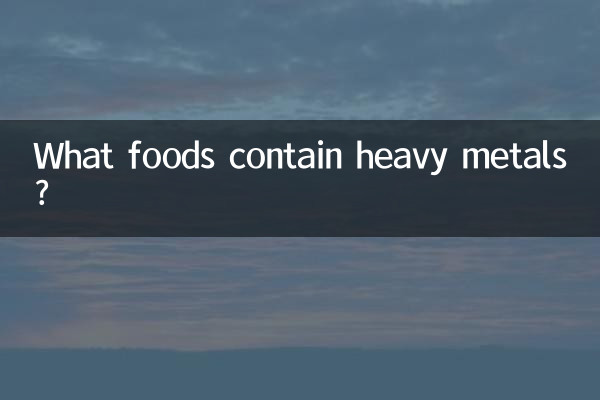What foods contain heavy metals? Analysis of hot topics in the past 10 days
In recent years, food safety issues have attracted much attention, especially the phenomenon of excessive levels of heavy metals in food. Heavy metals such as lead, mercury, cadmium, arsenic, etc. are extremely harmful to human health and may cause a variety of diseases. This article will combine hot topics and hot content in the past 10 days to provide you with a detailed analysis of which foods are likely to contain heavy metals and provide structured data for reference.
1. Common foods containing heavy metals

According to recent hot discussions on the Internet and expert analysis, the following foods are the "hardest hit areas" for heavy metal pollution:
| food category | Common heavy metals | Potential risks | Recommended intake |
|---|---|---|---|
| Seafood (such as tuna, swordfish) | mercury | Affects nervous system development | No more than 200 grams per week |
| Rice (especially brown rice) | arsenic | increased cancer risk | Diversified staple food sources |
| Offal (e.g. liver) | Cadmium, lead | Impair kidney function | No more than 2 times a month |
| Shellfish (such as oysters, clams) | Lead, cadmium | Affect children's intellectual development | Choose regular breeding products |
| Certain vegetables (such as spinach, mushrooms) | Lead, cadmium | Long-term accumulation is harmful to health | Wash thoroughly before eating |
2. Analysis of recent popular cases
1.Incident of excessive heavy metals in Internet celebrity seafood: The "Deep Sea Fish Raw" recommended by a well-known food blogger was found to contain three times more mercury than allowed, triggering discussions among netizens on the safety of eating raw seafood.
2.Controversy over arsenic content in imported rice: A certain international brand of rice was exposed to have arsenic content higher than the national standard, causing consumers’ trust in imported food to decline.
3.Safety issues of traditional tonics: High-end supplements such as bird's nest and cordyceps are frequently reported to contain excessive amounts of heavy metals. Experts recommend a rational view of their nutritional value.
3. How to reduce heavy metal intake
| measure | Specific methods | Effect |
|---|---|---|
| diverse diet | Rotate staple food sources and avoid eating the same food for long periods of time | Reduce accumulation of certain heavy metals |
| scientific cooking | Wash the rice thoroughly and blanch the vegetables | Can remove some heavy metals |
| Choose a safe source | Purchase products with test reports | Reduce the risk of exceeding standards |
| Control high-risk foods | Limit the intake of large fish and animal offal | Avoid excessive intake |
4. Expert advice and consumer coping strategies
1.Pay attention to the official test report: Regularly check the food safety inspection information released by the market supervision department.
2.Scientific understanding of risks: Don’t panic too much, but consciously control your intake of potentially risky foods.
3.Special groups need more attention: Pregnant women, children and the elderly should pay special attention to food choices to avoid the impact of heavy metals on sensitive groups.
4.Rights protection awareness: Report suspicious food to regulatory authorities in a timely manner to jointly maintain a food safety environment.
5. Recent progress in popular detection technologies
According to the latest reports, rapid detection technology has made breakthrough progress:
| Technical name | Test items | Detection time | Accuracy |
|---|---|---|---|
| nanosensor | Various heavy metals | 5 minutes | More than 95% |
| Portable spectrometer | Lead, cadmium | immediate | 90% |
| bioassay | mercury | 10 minutes | 98% |
Food safety is an important issue related to everyone's health. By understanding the sources and risks of heavy metals in food and taking scientific preventive measures, we can maximize the health and safety of ourselves and our families while enjoying delicious food. It is recommended that consumers maintain a rational attitude, pay attention to potential risks, do not panic excessively, and avoid risks through a diversified diet and a scientific lifestyle.